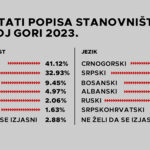- Five countries in Western Balkans to be able to get EU funding under Growth Plan
The EU IPA (Instruments of Pre-Accession) Commission approved the reform programs of Albania, Kosovo, North Macedonia, Montenegro, and Serbia.
The reform programs in the Western Balkan countries are a precondition for receiving funds under the new €6 billion Reform and Growth Instrument, known as the Western Balkans Growth Plan. Approved early May by the EU Council, the Plan aims to support the countries across the region on their way to EU membership.
It is expected that on October 16, the European Commission will approve the final decision on making payments under the Growth Plan and thus be ready to make the first payments from the package available to these countries.
The only country in the region that is yet to receive the approval of its reform program is Bosnia and Herzegovina, as the document that this country filed with the EU turned out to be incomplete and failed to take into account all the proposals put forward by the European Commission.
- At Berlin Process summit, new Action Plan signed for single regional market
The heads of government of the six countries in the Western Balkans – Albania, Kosovo, North Macedonia, Serbia, Montenegro and Bosnia and Herzegovina – signed off at the Berlin Process Summit a new Action Plan for the single regional market for the period from 2025 to 2028, as well as a new agreement on mobility, which provides access to higher education.
The summit was held in Berlin under the leadership of German Chancellor Olaf Scholz.
The new Action Plan for the Single Regional Market is an integral part of the Growth Plan for the Western Balkans. In addition to strengthening cooperation in the region, it should become a springboard for wider integration with the EU Single Market.
- Kosovo greenlights no-visa travel for BiH citizens
From January 1, 2025, Kosovo will unilaterally allow free entry into the country to holders of ID cards from Bosnia and Herzegovina, despite Republika Srpska’s refusal to ratify the Mobility Agreement on free movement.
Prime Minister of Kosovo Albin Kurti said this during the Berlin Process summit.
The agreement on freedom of movement between the six countries of the Western Balkans was signed in 2022 as part of the Berlin process. But Republika Srpska, which will support Serbia’s position on non-recognition of Kosovo, is blocking the decision on free movement for holders of Kosovo identity cards.
- Kosovo to be directly represented in CEFTA trade deal
In the Central European Free Trade Agreement (CEFTA), Kosovo will henceforth be represented directly, by its own institutions, not by UNMIK, the UN mission to Kosovo. The decision was made on October 10 at the CEFTA Joint Committee, which this year is chaired by Serbia.
UNMIK started representing Kosovo in CEFTA in 2007, when Pristina joined the agreement and a year prior to Kosovo declaring independence.
However, Kosovo will be referred to in CEFTA documents with an asterisk to mark its pending status.
The decision to represent Kosovo in CEFTA was made after Kosovo lifted the ban off imports from Serbia.
- Blockage of BiH parliament’s work slows down country’s European integration
Representatives of Bosniaks in the House of Peoples of the Parliament of Bosnia and Herzegovina once again skipped the meeting on October 8, thus creating a no-quorum situation. A group of Bosnian lawmakers has been blocking the work of one of the BiH parliament chambers since March.
Bosnians protest against the consideration of the draft law on the BiH Constitutional Court, which would expel foreign judges and in fact introduce voting by ethnicity in decision-making.
This law was tabled by a deputy from the Serbian Democratic Party (SDS).
Bosnian MPs believe that the draft law is an attack on the country’s constitutional order. “We demand that this bill be removed from the agenda,” Kemal Ademovic, head of the Bosnian faction, said October 8.
The United States Embassy in Sarajevo sharply criticized the position of the Bosnian faction. Diplomats stressed that the law on BiH’s Constitutional Court has no chance of passing the floor as it will not secure the required majority in the BiH parliament, so Bosniak representatives have been blockign the House of Peoples to score cheap political points. The Embassy’s statement emphasized that the cynical trick by the Bosnian faction is preventing normal legislative work at a time when BiH has a huge EU-related legislative reform agenda that it must address.
In March, Bosnia and Herzegovina received the consent from the European Council to launch negotiations on joining the European Union, but on the condition of passing several more reform laws prior to that. Since then, the parliament has been blocked and nothing has been done. Accordingly, the beginning of the negotiation process with the EU is in jeopardy.
- Dubrovnik Declaration adopted at “Ukraine – South East Europe” summit.
The participants of the summit condemned Russian aggression against Ukraine, referring to it as a “great threat to the peace, security and stability of South East Europe, the entire European continent and the world in general”, and declared their support for the independence, sovereignty, and territorial integrity of Ukraine.
The Declaration emphasizes the importance of compliance with the EU’s Russia sanctions policy and the need for “coherence” of the nations’ policies with the decisions and actions taken within the EU Common Foreign and Security Policy.
The participants reaffirmed the support for the European integration of the partners in South East Europe, Ukraine, Moldova and Georgia, and welcomed the fact that NATO confirmed its support for Ukraine on its way to full Euro-Atlantic integration.
The Declaration also expresses a firm resolve to bring to justice those responsible for crimes committed during Russia’s aggression against Ukraine.
The declaration was signed by Croatia’s Prime Minister Andrej Plenkovic and Ukraine’s President Volodymyr Zelensky, Vice President of the European Commission Dubravka Sujka, as well as the Presidents of Kosovo, Serbia, Slovenia, and Montenegro, Prime Ministers of Albania, Bulgaria, Greece, North Macedonia, Chairman of the Council of Ministers of Bosnia and Herzegovina, Ministers of Foreign Affairs of Moldova, Romania, and Turkey.
The President of Serbia, Aleksandar Vučić, claimed that he managed to have the clauses about the obligations to joining Russia sanctions provide military aid to Ukraine removed from the Declaration. However, according to analysts, most likely, Vučić’s statement was merely a PR move targeting an audience in Moscow.
- Turkey expanding defense industry cooperation with Albania, Serbia
Prime Minister Edi Rama of Albania and President Recep Tayyip Erdogan of Turjey signed a joint statement on deepening strategic partnership and three cooperation agreements in Tirana on October 10 – in the field of higher education, agriculture, public relations, and media. Also, during the visit of the Turkish president, the largest mosque in the region, built with the support of the Turkish side, was opened in Tirana.
Erdogan and Rama also discussed issues related to the defense industry. According to the Albanian Prime Minister, Turkey is transferring several kamikaze drones to Albania.
***
The presidents of Serbia and Turkey, Aleksandar Vučić and Recep Tayyip Erdogan, announced on October 11 in Belgrade that they would strengthen cooperation in various fields, especially in the field of defense industry.
“There is a huge potential for cooperation in the field of defense,” Erdogan emphasized.
“It is important to establish much closer relations for cooperation in the defense area, to create a team that would work on this,” Vučić said after talking with Erdogan. “The Turkish defense industry is much stronger than ours, but without feigning modesty, you can’t ignore Serbia either,” he noted, adding that Serbia had recently extended permits to Turkey and exported “huge amounts of ammunition.”
One of the main topics of talks between Vučić and Erdogan was economic cooperation.
The Turkish president described the relations between the two countries as a “golden age”. Over the past two years, trade turnover has reached $2 billion, Erdogan said. “The investments we have in Serbia exceed $400 million,” the Turkish president added.
During the visit, Turkey and Serbia signed off 11 agreements that strengthen cooperation in a range of areas, from trade to disaster relief.
***
Erdogan’s visit to Albania and Serbia demonstrated that the Western Balkans remain a priority in Ankara’s foreign policy, and that Turkey is one of the main actors in the region.
In addition, after the successful visit of the Israeli president to Tirana a month ago, it was important for the Turkish leadership to take steps to keep Albania and Serbia among its geopolitical allies.
- Pristina asks to reinstate security zone on border with Serbia. KFOR stands against it
Kosovo Prime Minister Albin Kurti called on the international community to restore the land and air security zones on the border between Serbia and Kosovo, 5km and 25km wide, respectively.
Kurti said Serbia was abusing the lift of the security zone by drawing additional troops to the border area.
A few days after his call, Kurti posted on Facebook several photos of Serbian soldiers who he claimed were stood within 50 meters of the border with Kosovo.
At the same time, the Ministry of Defense of Serbia dismissed Kurti’s statement as disinformation. As the ministry noted, the Serbian military was in the border area because they had to prevent the illegal export of timber to Kosovo.
The NATO mission in Kosovo, KFOR, is responsible for the security of Kosovo’s borders with Serbia.
Commenting to journalists on the possibility of reinstating the security zone, KFOR said they do not see the possibility of doing this on land and in the air along the Serbia and Kosovo border.
- Summit of Brdo-Brijuni Process took place in Tivat
The European Union is not complete without the countries of the Western Balkans – this is the joint message from the presidents of the countries across the region attending the Brdo-Brijuni summit, which took place on October 8 in Tivat, Montenegro.
The participants emphasized that the European Union enlargement that would involve countries from the Western Balkans, even more so today, is a geopolitical imperative. It was also emphasized that it is extremely important to maintain good neighborly relations.
Serbian President Aleksandar Vučić was not present at the plenary part of the summit, although he later joined the participants, stressing it was about his move to meet Montenegrin President Jakov Milatović, who once attended the Open Balkans summit in Belgrade at Vučić’s request.
The Brdo- Brijuni Process is a Slovenian-Croatian initiative launched in 2010 with the aim of building up trust and helping the countries of the Western Balkans on their way to the European Union. However, as observers note, in recent years the initiative has been more like a regional discussion club than a practical tool for European integration of the region.
- Migrant asylum centers set up by Italy in Albania opening doors
The facilities are located in the cities of Shengjin and Gjader in the municipality of Lezhe in northwest Albania, but remain under Italian jurisdiction and will be managed by Italy. The Albanian side will provide external security.
The centers will operate under a five-year deal signed last November by Italian Prime Minister Giorgia Meloni and her Albanian counterpart, Edi Rama. The deal was hailed by European Commission President Ursula von der Leyen as an example of “outside the box thinking” in tackling migration to the European Union, but was criticized by rights groups as setting a dangerous precedent.
It is planned that up to 3,000 migrants picked up by Italian coast guards in international waters each month will first be screened aboard the rescue ships before being forwarded to Albania for further screening.
Asylum seekers whose applications have been accepted will be transferred to Italy with a residence permit. Those who get a refusal will be repatriated at Italy’s expense.
The operation of two asylum centers for migrants in Albania over a fiv-year period will cost Italy EUR 670 million.



